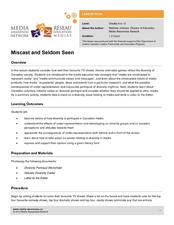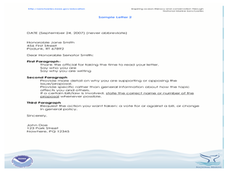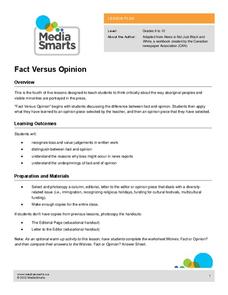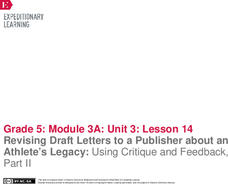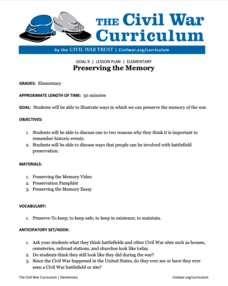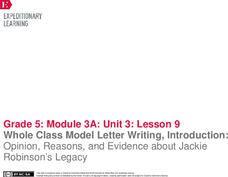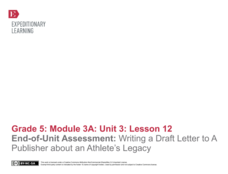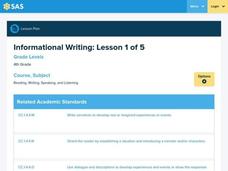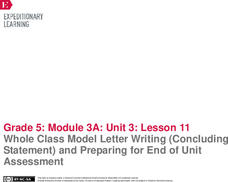Curated OER
Miscast and Seldom Seen
Consider how well high schoolers' favorite TV shows, movies and video games reflect the diversity of society. The lesson plan introduces your class to several media literacy concepts, such as how media conveys values and messages, as...
Curated OER
Expressing Your Views to the Letter
Analyze the motivation, purpose, and value of letters to the editor by examining letters written in response to the violence at Columbine High School. For homework, middle and high schoolers write their own letters to the editor about an...
Curated OER
Write On!
Help empower your class by learning about the editorial section of the newspaper. They will have the option to also write to a politician. The goal is to teach students how to speak-up and express their opinions on important issues....
Curated OER
It's Your Opinion
Everyone has a different opinion about the characters they read about in books. Have your class explore forming an opinion and finding evidence to support it as they read and discuss what they think about a particular character. They...
Curated OER
Eastside Literacy Reading Lesson - Fact or Opinion
Analyze critical thinking skills that involve the ability to distinguish between fact and opinion through self-reflection. Higher education students will collect a newspaper article, advertisement, magazine article, tabloid article,...
Kenan Fellows
Letter Writing to Politicians on Environmental Issues
Let your voices be heard! Pupils research local and national environmental concerns using the Internet. Class members determine an issue they deem important and draft a letter to a local politician expressing their...
Curated OER
Shizuko’s Daughter: Unsent Letter
Have you ever wanted to tell a character what you really thought of him or her? Use a lesson based on Kyoko Mori's Shizuko's Daughter to encourage learners to write a letter in response to a character's actions.
Curated OER
In My Opinion
Young writers craft letters to the government stating their opinion on different topics. They pick an environmental or ocean issue, research it, and craft their formal persuasive letter. Ensure your learners include supporting facts and...
Curated OER
Persuasive Writing - Anticipating Opposing Views
Persuasion, when used effectively, is a powerful and effective tool. In groups, young writers develop a persuasive letter about something that they would like their parents to allow them to do. Then, independently, they use proper...
Curated OER
Persuasive/Argumentative Essay vs. Opinion writing
Reinforce persuasive and argumentative writing skills with this activity, which utilizes SchoolNet News Network's website/SNN Monthly magazine. Young writers review journalism writing styles that help them explain that writing a...
Media Smarts
Fact versus Opinion
Part of a series aimed at breaking down cultural bias from the Canadian Media Awareness Network, this activity identifies where opinions do and don't belong in a newspaper. Pupils review handouts about the purpose of editorial comments...
EngageNY
Revising Draft Letters to a Publisher about an Athlete’s Legacy: Using Critique and Feedback, Part II
Let's get opinionated. Scholars participate in a peer critique and revision process using a fun activity called a Four Corners strategy. After incorporating classmates' feedback, individuals share their final drafts of their opinion...
EngageNY
Revising Draft Letters to a Publisher about an Athlete’s Legacy: Critique and Feedback, Part I
Pick a corner, any corner! Pupils use the Four Corners strategy and Peer Critique protocol to assess one another's draft letters to a publisher about an athlete's legacy. Scholars then use peer feedback to revise their letters.
Curated OER
A Way with Words
How do facts and opinions impact the news? After reading "How to Cover a War" from the New York Times, middle schoolers evaluate the claims in the article. They also consider the media's responsibilities in reporting during wartime....
American Battlefield Trust
Preserving the Memory
Civil War battlefields themselves are under siege by development and other forces. Using materials from the Battlefield Trust, individuals explore local areas that face threat and write letters to support their preservation. An...
EngageNY
Whole Class Model Letter Writing, Introduction: Opinion, Reasons, and Evidence about Jackie Robinson’s Legacy
Sharing is caring! Using the collaborative lesson, scholars engage in a shared writing process with the teacher. Working together, they compose opinion letters about Jackie Robinson's legacy.
Curated OER
Draft Dilemmas
Consider the possibility of a new U.S. draft with this lesson, which encourages class debate and persuasive arguments. Middle and high schoolers discuss how such a draft might be enacted and how they would feel about it. They write...
EngageNY
End-of-Unit Assessment: Writing a Draft Letter to A Publisher about an Athlete’s Legacy
Serving as the end-of-unit assessment, scholars draft letters to a publisher about an athlete's legacy. They then reflect on their progress by completing a self-assessment.
Curated OER
Fact V. Opinion
Students use statements out of newpapers to distinguish between facts and opinions. They discuss these differences as well.
Pennsylvania Department of Education
Informational Writing
Emerging writers identify an informational piece of writing. They are provided with examples of informational writing and view a PowerPoint on narrative writing. Then, they design their own informational writing with a brochure,...
Curated OER
Opinion through the Ages: Exploring 40 Years of New York Times Op-Eds
What is the role of a newspaper's Op-Ed page? High schoolers explore the New York Times' "Op-Ed at 40," an interactive feature that lets them browse through 40 years worth of op-ed features, and consider the purpose and value of this...
EngageNY
Whole Class Model Letter Writing (Concluding Statement) and Preparing for End of Unit Assessment
Pupils work in small groups to collaboratively write a concluding paragraph for their opinion letters about Jackie Robinson's legacy. Then, scholars share their opinion, reasons, and evidence with a classmate.
EngageNY
Whole Class Model Letter Writing: Organizing Reasons and Evidence and Using Transition Words
Where's the evidence? Scholars practice ordering the evidence and reasons for their class opinion papers by physically sorting them. Next, they work collaboratively to write a body paragraph, using linking words to connect their ideas...
EngageNY
Mid-Unit Assessment: Notes and Graphic Organizer for a Letter to a Publisher
It's the halfway point! Scholars complete a mid-unit assessment to showcase their knowledge and skills so far. They create a graphic organizer, write an opinion about how their athlete created a legacy, and then record the best reasons...
